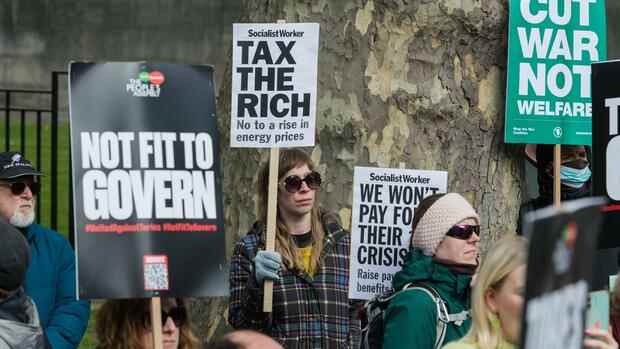The sharp rise in the cost of living is provoking public protest.
(Photo: IMAGO/NurPhoto)
London Britain’s economic dilemma can be summed up in three figures: Inflation rose to seven percent in March, the highest level in 30 years.
At the same time, the unemployment rate fell to 3.8 percent, below the level at the beginning of the pandemic. Meanwhile, economic growth almost stalled in February, posting a meager 0.1 percent mom.
For economists, these are clear symptoms of an impending stagflation – i.e. a stagnant economy with high price increases. For central bank chief Andrew Bailey, it is a “historic shock for real incomes” in Britain.
His biggest concern is that a wage-price spiral will set in in the UK and the Bank of England (BoE) will be forced to tighten interest rate brakes even more. The BoE has raised interest rates three times since December, most recently to 0.75 percent, and the next rate hike could follow in early May.
Top jobs of the day
Find the best jobs now and
be notified by email.
There are many first signs that wages in the island kingdom are rising with the prices. According to the British association for recruitment agencies REC, starting salaries rose more sharply in March than at any time in the past 25 years.
Staff is tight after Brexit and lockdowns
Retail and other service providers in particular are desperately looking for new staff. The strong increase in demand after the end of the lockdowns and a lack of workers from the EU after Brexit have squeezed the supply on the labor market.
The supermarket chain Tesco has just increased the salaries of its employees by six percent. Competitor Sainsbury’s now pays its employees a “living hourly wage” that is even higher than that of rival Tesco.
“We know times are tough for everyone,” said Sainsbury’s CEO Simon Roberts, referring to the sharp rise in the cost of living. But the telecom provider BT Group also paid 58,000 employees a bonus of 1,500 pounds (1,800 euros) at the beginning of April.
But that’s not enough for the Communication Workers Union (CWU). She points to the significantly higher cost of living and threatens to go on strike. In fact, the British central bank also assumes that after 2021 consumer prices will rise more sharply than wages and salaries this year.
The wage increases are also put into perspective by a new study by the British think tank Resolution Foundation. According to this, average earnings increased by only 2.7 percent in the past year – which corresponds exactly to the increase in the year before the pandemic.
The statistics are distorted by the end of the wage cuts associated with short-time work (base effect) and the labor shortage in four service industries. “The increase in wages is more normal than extraordinary, considering the end of short-time work,” said Nye Cominetti. Economist at the Resolution Foundation.
The think tank expects UK nominal wages to rise by around 5 percent this year. That would still be one percentage point more than in the previous year, but by far not enough to compensate for the inflation rate, which economists forecast could rise to more than nine percent as early as April. Many employees in the public sector are hit particularly hard, as their salaries are even less able to keep up with prices than wages in the private sector.
Markets expect further rate hikes
“There are still no signs that wages and salaries are rising faster than prices,” emphasizes economist Cominetti. It is doubtful, however, that this will be enough to prevent the Bank of England from raising interest rates further.
Catherine Mann, a member of the BoE’s monetary policy committee, had already warned in January that rising wage costs were being reflected in inflation expectations for 2022. “A change in expectations is the first line of defense against increasing wage-price dynamics,” said the central banker.
After the most recent inflation shock, the money markets are already pricing in further interest rate increases this year of almost 150 basis points, i.e. 1.5 percentage points. “My goal is to get inflation back on target (2 percent) so workers can enjoy real wage increases for their jobs,” said central banker Mann.
For all those Britons who have agreed variable interest rates for their mortgages and now have to reckon with higher rates, this is of little consolation.
More: The Russian crisis saved Boris Johnson politically – for the time being



